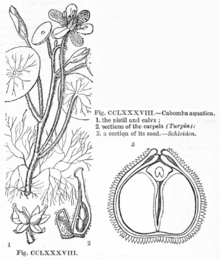Cabomba
| Cabomba | |
|---|---|

| |
| Cabomba aquatica (from Lindley 1853) | |
| Scientific classification | |
| Kingdom: | Plantae |
| Clade: | Tracheophytes |
| Clade: | Angiosperms |
| Order: | Nymphaeales |
| Family: | Cabombaceae |
| Genus: | Cabomba Aubl. |
| Species | |
|
See text | |
Cabomba is an aquatic plant genus, one of two belonging to the family Cabombaceae. It has divided submerged leaves in the shape of a fan (hence the vernacular name fanwort) and is much favoured by aquarists as an ornamental and oxygenating plant for fish tanks. Use in the aquarium trade has led to some species being introduced to other parts of the world, such as Australia, where they have become weeds.
Species
- Cabomba aquatica Aubl. (fanwort)
- Cabomba caroliniana A. Gray (green cabomba)
- Cabomba furcata Schult. & Schult.f. (red cabomba)
- Cabomba haynesii Wiersema
- Cabomba palaeformis Fassett
Cabomba as an aquarium plant
Cabomba is frequently planted in aquaria, as an attractive-leaved water plant that is fast-growing (up to one inch per day). Green cabomba (C. caroliniana) is the most common, and the easiest aquarium subject. By contrast, red cabomba (C. furcata) is considered[citation needed] to be one of the hardest plants to care for in the aquarium.
Flowers and reproduction

The perianth of Cabomba is either trimerous (having members in each whorl in groups of three) or bimerous (in groups of two) with white, oval-shaped petals, and is usually about 2.0 cm across when fully developed. The petals are unlike the sepals in that the former have two yellow ear-shaped nectaries at the base. Petals may also have purplish edges. Flowers are protogynous, having primarily female sexual structures on the first day of appearance and then switching to male on the second and subsequent days. Flowers emerge and are designed to be pollinated above the waterline. Principal pollinators are flies and other small flying insects.[1]
References
- ^ Klaus Kubitzki; Jens G. Rohwer; Volker Bittrich (28 July 1993). Flowering Plants · Dicotyledons: Magnoliid, Hamamelid and Caryophyllid Families. Springer Science & Business Media. p. 159. ISBN 978-3-540-55509-4.
- Ørgaard, M. (1991). The genus Cabomba (Cabombaceae) - a taxonomic study. Nordic Journal of Botany 11: 179-203
- Day, C., Petroechevsky, A., Pellow, B., Bevan, J., O’Dwyer, T., StLawrence, A. and Smith, G. (2014). Managing a priority outlier infestation of Cabomba caroliniana in a natural wetland in the Blue Mountains, NSW, Australia – could this be eradication? Draft Paper to 19th Australasian Weeds Conference, Hobart, Australia.
- Fassett, N.C. 1953. A monograph of Cabomba. Castanea
External links
![]() Media related to Cabomba at Wikimedia Commons
Media related to Cabomba at Wikimedia Commons
